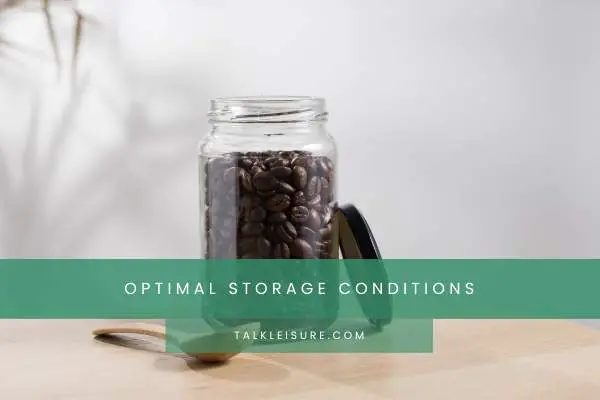Storing coffee beans properly is essential for preserving their freshness and flavor.
As a coffee lover, you want to ensure that every cup you brew is of the highest quality.
Here, we will discuss the importance of storing coffee beans correctly and the factors that can affect their freshness.
1. Choose Whole Beans Over Ground

When storing coffee beans for maximum freshness and flavor, choosing whole beans over ground is a crucial factor.
Whole beans have a longer shelf life and retain their flavor for a longer period compared to ground coffee.
The main reason for this is the surface area.
When coffee beans are ground, more of their surface area is exposed to air, causing them to oxidize and go stale faster.
On the other hand, whole beans have a protective outer layer that helps to seal in the freshness and flavor.
By choosing whole beans, you can grind them just before brewing, ensuring that you extract the maximum flavor from each bean.
This is because coffee beans release their aromas and flavors when they are freshly ground, enhancing the overall taste of your cup of coffee.
Additionally, whole beans allow you to control the grind size based on your preferred brewing method.
Different brewing methods require different grind sizes, and by grinding your beans fresh, you can customize the grind to achieve the optimal extraction and taste.
Moreover, whole beans offer a wider variety of flavors and options.
You can explore different types of coffee beans from various regions and experiment with different roast levels to find the perfect flavor profile that suits your taste buds.
2. Optimal Storage Conditions

Creating optimal storage conditions is crucial to maintaining their freshness and flavor when storing coffee beans.
Here are some key factors to consider:
Temperature: Coffee beans should be stored in a cool and consistent environment.
Excessive heat can cause the oils in the beans to degrade and affect the taste.
Ideally, the temperature should be around 70 degrees Fahrenheit (20 degrees Celsius).
Humidity: Moisture is the enemy of coffee beans.
Exposure to high humidity can lead to the growth of mold and bacteria, which can ruin the beans.
It is important to store coffee beans in a dry environment, away from any sources of moisture such as the kitchen sink or dishwasher.
Airflow: While coffee beans need to be protected from excessive air exposure, they also require some airflow to prevent the build-up of trapped gases.
This can be achieved by storing the beans in a container with a one-way valve that releases CO2 gas while keeping out oxygen.
Cupboard or Pantry: The best place to store coffee beans is in a dark and enclosed space, such as a cupboard or pantry.
This helps to protect the beans from exposure to light, which can degrade the quality and flavor.
Avoid the Freezer: While it may be tempting to store your coffee beans in the freezer to extend their shelf life, this can actually do more harm than good.
The freezing and thawing process can cause moisture to accumulate on the beans, resulting in loss of flavor and quality.
By following these optimal storage conditions, you can ensure that your coffee beans stay fresh and flavorful for a more extended period.
Remember, protecting them from heat, humidity, light, and excessive air exposure is key.
So, next time you buy a batch of coffee beans, make sure to store them correctly to enjoy a delicious cup of coffee every time.
3. Airtight Containers Are Your Best Friend
Now that you understand the importance of creating optimal storage conditions for your coffee beans, it’s time to discuss the best way to store them.
Airtight containers are a coffee lover’s best friend when it comes to preserving the freshness and flavor of your precious beans.
Why are airtight containers important?
Well, the enemy of freshness is oxygen.
When coffee beans are exposed to air, they begin to oxidize, which leads to the breakdown of flavors and aromas.
By storing your beans in an airtight container, you can minimize their exposure to oxygen and prolong their shelf life.
When choosing an airtight container for your coffee beans, look for one with a strong seal and a one-way valve.
The one-way valve is crucial because it releases carbon dioxide gas naturally produced by the beans while preventing oxygen from entering.
This ensures that your beans stay fresh without compromising their quality.
Plastic containers with airtight lids or glass jars with rubber seals are popular for storing coffee beans.
Ensure the container is clean and dry before transferring your beans into it.
Avoid using containers made of materials that can absorb odors, as this can taint the flavor of your coffee.
Remember to store your airtight container in a cool and dark place, away from any heat or light sources.
Heat and light can accelerate the degradation process and affect the taste of your coffee beans.
4. Keep Away From Light And Heat

In addition to storing your coffee beans in airtight containers, keeping them away from light and heat is crucial.
Both light and heat can have a detrimental effect on the quality and flavor of your beans.
Exposure to light can cause your coffee beans to oxidize rapidly, losing flavor and freshness.
UV light, in particular, can accelerate this process.
To protect your beans from light, store them in a dark place, such as a pantry or cabinet, away from windows or other sources of direct sunlight.
Heat is another enemy of coffee beans. High temperatures can cause the oils and aromatics in the beans to break down, resulting in a bland and stale taste.
To prevent this from happening, ensure that your beans are kept in a cool environment.
Avoid storing them near appliances that generate heat, such as the oven or stovetop.
If you live in a scorching climate, storing your coffee beans in the refrigerator may be beneficial.
However, remember that frequent temperature changes can lead to condensation, harming the beans.
If you choose to refrigerate your beans, make sure they are stored in an airtight container to minimize exposure to moisture.
5. Avoid Moisture At All Costs
Proper storage of coffee beans requires protecting them from moisture.
This is because moisture can greatly affect the quality and taste of your beans.
When coffee beans come into contact with water, they can absorb it, causing them to lose their natural flavors and aromas.
Additionally, moisture can lead to mold growth, ruining your entire batch of beans.
To avoid moisture, it is essential to store your coffee beans in airtight containers.
This helps create a barrier between the beans and the outside air, preventing any moisture from seeping in.
Look for containers with rubber seals or lids that lock tightly to ensure maximum protection.
It is also essential to keep your coffee beans away from areas with high humidity, such as the kitchen countertop near the sink or the refrigerator door.
These areas can have excess moisture, eventually finding its way into your coffee beans.
Consider using desiccant packs or silica gel packets in your coffee storage containers if you live in a particularly humid climate.
These can help absorb any excess moisture and maintain the freshness of your beans.
6. Freeze With Caution

Freezing coffee beans can be a controversial topic among enthusiasts.
Some swear by it, while others argue that it can negatively impact the flavor and quality of the beans.
However, if done correctly, freezing can help preserve the freshness of your coffee beans for an extended period.
When it comes to freezing coffee beans, the key is to do it cautiously.
Here are a few tips to ensure that you freeze your beans properly:
- Use airtight containers: Transfer them to airtight containers or resealable bags before freezing your coffee beans.
Make sure to remove as much air as possible to prevent freezer burn.
- Divide into portions: It’s best to freeze your coffee beans in smaller amounts.
This way, you can only defrost what you need without repeatedly thawing and refreezing the entire batch.
- Label and date: Remember to label the containers or bags with the type of coffee and the freezing date.
This will help you keep track of their freshness and prevent any mix-ups.
- Avoid frequent thawing: Once you’ve taken a portion of frozen coffee beans out for use, try to avoid refreezing them.
Frequent thawing and refreezing can degrade the flavor and aroma of the beans.
- Allow time to reach room temperature: Before grinding or brewing the frozen coffee beans, allow them to come to room temperature.
This will ensure a more consistent extraction and better flavor in your cup.
Following these precautions, you can safely freeze your coffee beans and enjoy fresh-tasting coffee for an extended period.
However, freezing is best suited for whole beans rather than pre-ground coffee, as the latter tends to degrade more quickly.
So, freeze with caution and savor the rich flavors of your favorite coffee whenever you desire.
7. Grind Just Before Brewing
One crucial step in the coffee brewing process that often gets overlooked is grinding the beans before brewing.
This may seem like a small detail, but it can significantly impact the taste and quality of your coffee.
When coffee beans are ground, they release aromatic oils, flavors, and gases immediately.
These compounds are what give coffee its rich aroma and taste.
However, once the beans are ground, these compounds start to oxidize and dissipate, resulting in a loss of flavor and freshness.
You can preserve these essential elements by grinding your beans just before brewing and ensure your coffee tastes its best.
When you grind the beans, you expose a larger surface area, allowing the hot water to extract the flavors more efficiently.
This results in a more flavorful and aromatic cup of coffee.
In addition, freshly ground coffee beans offer more control over the extraction process.
Depending on your preferred brewing method, you can adjust the grind size to match the brewing time and water contact, maximizing the extraction and achieving the desired flavor profile.
To grind your coffee beans, it’s recommended to invest in a good quality burr grinder.
Burr grinders provide a consistent grind size and allow for adjustment to suit different brewing methods, such as espresso, French press, or pour-over.
8. Rotate Your Stock

One crucial tip that often gets overlooked when storing coffee beans is to rotate your stock.
Like any other perishable product, coffee beans have a limited shelf life, and they can lose their freshness and flavor if not properly managed.
By rotating your stock, you ensure that you use the oldest beans first and prevent any beans from sitting around too long.
This is especially important for coffee shops or businesses with a large bean inventory.
To effectively rotate your stock, follow a simple first-in, first-out (FIFO) system.
This means the oldest beans are used first, while the newest ones are stored for later use.
Labeling your beans with the date of purchase or roast is a good idea to make it easier to keep track.
Rotating your stock helps maintain the freshness and quality of your coffee beans and allows you to experiment with different flavors and origins.
You can introduce new varieties and blends into your rotation, offering your customers a diverse and ever-changing selection of coffee.
Additionally, rotating your stock can help prevent waste and save money.
By using up older beans before they lose their flavor, you reduce the chances of having to throw away expired or stale coffee.
9. Keep Away From Strong Odors
When storing coffee beans, one often overlooked tip is to keep them away from strong odors.
Coffee beans are like sponges when it comes to absorbing odors; if exposed to strong-smelling substances, they can quickly take on those flavors.
This can result in your coffee tasting strange or unpleasant.
Strong-smelling substances to avoid include spices, herbs, garlic, onions, and other spicy foods.
Keeping your coffee beans away from cleaning products, chemicals, and any other items with strong odors is also essential.
To prevent your coffee beans from absorbing unwanted smells, storing them in airtight containers is best.
This will help create a barrier between the beans and any odors in the surrounding environment.
Mason jars, resealable bags, or specially designed coffee storage containers are all excellent options for keeping your beans fresh and odor-free.
Another useful tip is to avoid storing coffee beans near appliances or other heat-producing items.
Heat can accelerate the aging process of the beans and negatively affect their flavor.
Instead, choose a cool and dark location for your coffee bean storage, away from direct sunlight and any heat sources.
Conclusion
Properly storing coffee beans is essential for maintaining their freshness and flavor.
Whole bean coffee stays fresh longer than pre-ground coffee because it has less surface area exposed to air.
Store your coffee beans in airtight containers to prevent exposure to air, which can lead to oxidation and flavor degradation.
Light can cause coffee beans to become stale more quickly, so store them in a dark place or opaque containers.
Heat and moisture can negatively impact the flavor of your coffee beans, so keep them in a cool and dry place.
Contrary to popular belief, freezing coffee beans can actually lead to moisture damage and flavor loss.
Grinding coffee beans releases their natural oils, which can quickly degrade.
For the freshest taste, grind your beans just before brewing.
Only purchase the amount of coffee beans you can consume within 1-2 weeks to ensure maximum freshness.
Coffee beans are porous and can absorb strong odors, so keep them away from spices, herbs, and other pungent foods.
Invest in a high-quality coffee storage system, such as airtight containers, mason jars, or specially designed coffee storage canisters, to keep your beans fresh and protected.
Following these tips, you can enjoy a consistently delicious cup of coffee every time.
Remember, freshness is key in coffee beans, so take the time to store them properly and savor the full flavor and aroma of your favorite brew.
Related Posts: 5 Coffee Art Techniques and How to Master Them
5 Most Expensive Coffees in the World and What Justifies Their Price












